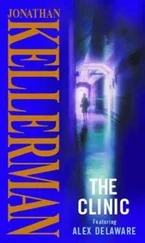“It is a lovely car, isn’t it? He maintains it like a clock- washing, polishing, vacuuming every week, but, no, I wouldn’t think he’d take it. When he travels he generally has a cab pick him up. Or he drives his other car and leaves it at the airport.”
“His other car?”
“His van,” she said. “He’s got a Ford van, an old one, but in perfect shape. He told me he bought it at a city auction. Used to belong to the Coroner’s Office, isn’t that a bit delicious?” The old woman hugged herself. “Professor Chess assured me it had been cleaned out thoroughly. They always are.”
“They?” said Jeremy.
“Morgue things.” Another giggle. “Death things.”
Halfway back to the city, the storm hit. Jeremy fishtailed for miles, drove with a misted windshield, felt his brakes lose confidence, was nearly part of a seven-car pileup. Toward the end, he gave himself over to the Fates. Miraculously, he arrived home in one piece and had a dinner of canned soup and toast and black coffee.
The following night, he and Angela finally stole away from the hospital, and he took her to a higher grade of restaurant than ever before; off Hale Boulevard, on the North End. Because of the weather, they rode in a taxi, and Jeremy supplied umbrellas for both of them.
A lesson from Arthur.
The place was green suede walls, granite banquettes, starched linens the color of fresh butter. On the way to their rear booth, Jeremy and Angela passed an iced case of fish so fresh the creatures’ eyes stared back reproachfully, another containing fat-marbled prime cuts of beef and pork. Pugnacious lobsters, their pincers bound, clawed the spotless sides of a ten-foot aquarium.
The savagery of good living.
Jeremy had made a reservation two days before and gotten another resident to cover for Angela. A guy who’d rotated through Psych as an intern and sat in on a couple of Jeremy’s lectures.
The ambience, the food, all that was great. The planning was what impressed Angela to the point of moist eyes.
She sat right up against him, their thighs laminating.
“After this, how am I going to go back to resident’s fare?”
“Ease into it,” said Jeremy. “Avoid undue sensory shock.”
“This is pretty shocking,” she said. “Being treated like this.”
“I’ll bet you’re no stranger to that.”
“Why do you say that?”
“Only daughter in a professional family. Something tells me you’ve experienced the finer things in life.”
“You’re right,” she said. “They raised me with love, gave me what I wanted, always told me I could achieve anything I put my mind to. By all accounts, I should never lose confidence, right? But I do. Nearly every day. This job, all those people, depending on me. What if I misplace a decimal place on an order? Or fail to catch it when someone else does- that actually happened to me when I was an intern. Some puffed-up attending more concerned about billing than taking care of his patients dashed off an insulin scrip for a diabetic. A hundred times too much. We would’ve had a sudden death, and everyone would’ve been puzzled.”
“You caught it?” said Jeremy.
She nodded. A China Doll waitress brought complimentary melon liqueur in tiny green glasses and a lacquered tray of various fried things. Angela massaged her glass. Picked up a baby octopus, muttered, “Too cruel,” and placed it back on the plate.
“So you saved a life. Good for you.”
“I almost didn’t catch it, Jer. The syringe was already loaded- prepared by a nurse- and I was supposed to give the shot, and I just happened to glance down and read the order. I’ll never forget the look on the patient’s face. An old guy, an old sturdy guy who’d operated heavy machinery in his heyday and still liked to flirt. He must’ve seen my face, realized how thrown I was. He said, ‘Everything okay, girlie?’ ‘Sure,’ I said and I made a big show of inspecting the syringe. Then I lied, told him something was wrong with the needle, too many air bubbles, we needed to get a fresh one. I left him there, tossed that damn syringe in the nearest biohazard bin, called the head nurse over, and showed her the order. This was a smart woman, an experienced woman, she knew as much about dosages as most physicians. She said, ‘Oh, my,’ then she recovered, and it was, ‘Of course, we’re not going to tell anyone, are we?’ And I said, ‘Of course not.’ She suggested I alter the original order to where it should’ve been, and I did. Then I loaded up a new syringe, went back in, gave the poor patient his shot. He smiled at me. ‘There you are, I been missin’ you. Maybe you and I can go out some day, honeybunch, cut a rug.’ I smiled back- too shaken up to be offended and besides, he’s an old guy, another generation, how can you take offense? I said, ‘Well, Mr. So and So, you just never know.’ And when I left, I give my rear a little shake. To cheer him up- I know it was tacky, but this guy almost died, and I was almost the one who killed him. He deserved a little joy, no? A little atonement from me, too.”
Her lips shook. Lifting the tiny green glass, she tossed back her drink.
Jeremy said, “Nothing to atone for. You’re the hero of the story.”
“Pure luck. So close. Since then, I’ve been paranoid about dosages, double- and triple-check everything. Maybe it’ll make me a better doctor. You know the worst part of it? The attending- the idiot who couldn’t keep his decimal places straight- he never knew. We protected him, never told him. So what does that make me? A coconspirator?”
“If you’d told him, he’d have denied it. And you’d have come out the worst for it.”
“I know, I know,” Angela said, miserable. “This is some romantic evening- I’m sorry, Jer.”
Jeremy nuzzled the warm, sweet place behind her ear. So smooth, women. So finely wrought.
She said, “You’re a wonderful guy. Please, let’s keep this going.”
A week later, he received a postcard from Oslo.
Stunning photography, some place called the Vigeland Sculpture Gardens. Monumental carvings of hypermuscular figures displayed in a verdant parklike setting. To Jeremy’s eye, the images were aggressively proletarian- Wagnerian.
On the back of the card was fore-slanted writing in black fountain pen ink:
Dear Dr. C-
Traveling and learning. A.C.
The old guy picks up and leaves just like that. And why not? Arthur was retired, lived alone, had no work obligations.
Had downsized.
Jeremy was certain the Victorian had been abandoned for some reason other than Arthur’s sudden insight that the house was too large.
Ramona Purveyance knew the reason, she’d almost let it slip- he’d knocked around there too long after…
But when Jeremy had pressed, she’d finessed.
Had there been some tragedy in Arthur’s life? Some life-changing event? Perhaps the old man had simply confronted one of life’s routine tragedies: widowerhood.
Loss of the doting wife Jeremy had imagined. That would’ve been more than enough to insult Arthur’s gregariousness. Leading him to seek his pleasures elsewhere.
Late suppers with like-minded eccentrics.
Jeremy placed the postcard in a desk drawer. The next time he saw Anna, the faculty office secretary, he thanked her for providing Arthur’s address, told her Arthur loved the gift, was now traveling.
“Yes, he does that,” she said. “Sends me the prettiest postcards. So considerate.”
“A good way to occupy oneself,” said Jeremy.
“What is?”
“Travel. What with his living alone and all that.”
“I’m sure you’re right.”
“How long has he been single?”
Читать дальше












